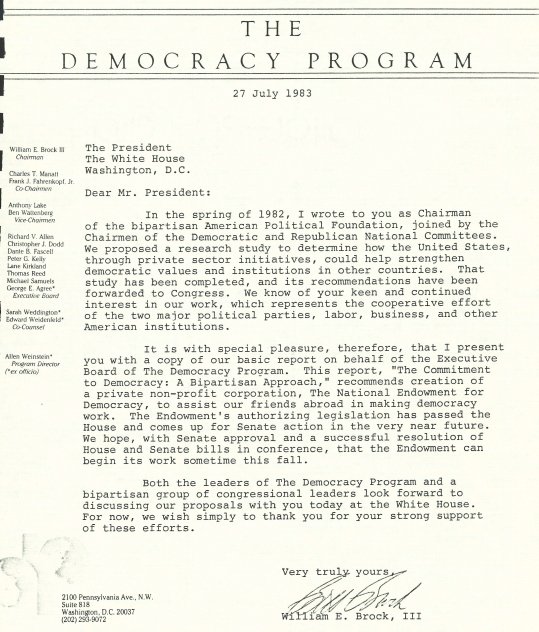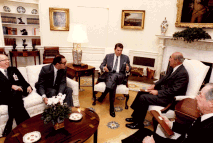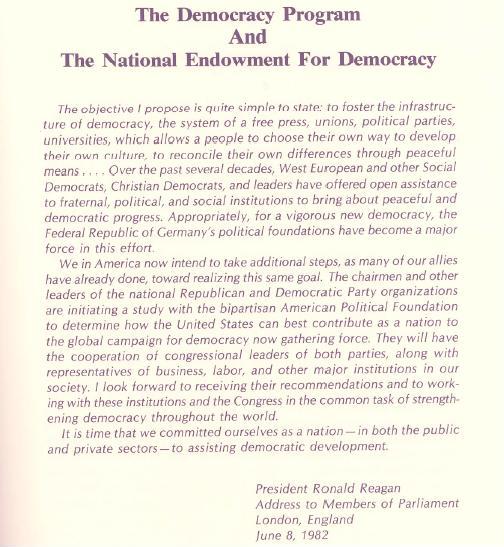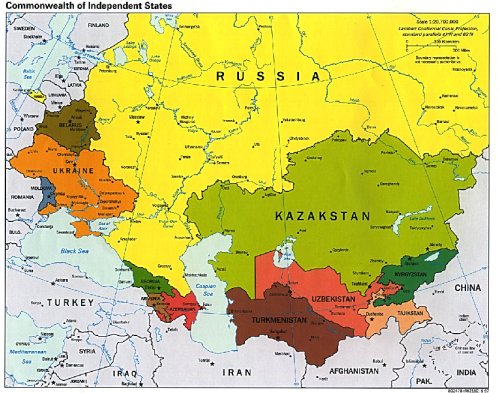Battle of Ideas and Systems - Part 3
Democracy as the Trojan Horse
A 'Battle of Ideas and Systems' is a war of low intensity conflict. Jack Nelson-Pallmeyer defined it this way:
"Low intensity conflict is as much a war of images, ideas and deception as it is a war of bullets and bombs. The ability to create images that obscure reality is a powerful weapon..."
Jack Nelson-Pallmeyer
"War Against The Poor, Low Intensity Conflict and Christian Faith", Orbis Books, 1990, p. 4-5
If we in the alternate media understand nothing else, at a minimum, we understand that there is precious little truth to be found in the mainstream media and in our political circles. There are plenty of lies, distortions, misdirection, sensationalism and sheer nonsense, but very little truth. The wasteland of mainstream public discourse begins to make sense in the context of a covert "Battle of Ideas and Systems" that nobody bothered to tell us about - but to which we were all involuntarily conscripted.
Going back to
President Ronald Reagan's speech to the British Parliament in June of 1982,
Reagan proposed the establishment of an independent government agency to
be Command Central for western propaganda and insurgency for export to
eastern bloc countries (allegedly). The
National Endowment for Democracy (NED)
was the agency that was created for that purpose.
National Endowment for Democracy History
NED is a government chartered and funded agency. They receive a relatively small budget so it would seem that they are actually a "pointer" organization. They set or pass through the policies and then "point" at the non-profits (NGO's), Think Tanks and political parties that will carry out the policy (propaganda and actions).
The idea for NED was put forth in the spring of 1982 by William Brock, then U.S. Trade Representative and Chairman of a private organization called the American Political Foundation.
The Democracy Program (large pdf)

So what's wrong with this picture? The President of the National Endowment for Democracy, Carl Gershman was head of the Social Democrats, USA from 1974 to 1980. Social Democrats are socialists - aka communists.
In 1984 at the request of Senator Malcom Wallop, the GAO did a study titled, "Events Leading to the Establishment of the National Endowment for Democracy". Why he requested the study can be inferred from the description of how the legislation for NED was passed. It was slipped in the backdoor after it was rejected through the front door (See Adobe pages 14-15).
Institute for Policy Studies - Gershman profile:
Gershman became head of SD-USA shortly after the Socialist Party-USA split into two factions in the early 1970s: a left wing led by Michael Harrington, and a right wing led by Gershman, Tom Kahn, and Rachelle Horowitz. The right faction morphed into SD-USA, which in the early 1970s rallied around Sen. Henry "Scoop" Jackson, the hawkish Democrat from Washington State whose staff was made up of several future key neoconservative figures, including Richard Perle, Frank Gaffney, and Elliott Abrams. Like many of these neoconservatives, Gershman was tapped to serve in the Reagan administration. In 1984, Gershman took over the helm of the NED, a congressionally funded organization created by Ronald Reagan in 1982 to support groups that promote democracy in the Soviet Union and other communist countries (see GroupWatch Profile: SD-USA; and "Loose Cannon," Cato Institute, 1993).
Jim Bovard, Independent Researcher, Writer, Activist, wrote this about Gershman and NED's beginning in an article titled, "The National Endowment for Democracy's Forgotten Sordid History" (emphasis added):
NED’s second president, Carl Gershman, a former executive director of the Social Democrats USA, a splinter group of the Socialist Party, asserted in August 1984 that direct federal aid to private organizations would allow the United States to “engage in the competition in the world of ideas.” He complained that “the word ‘democracy’ has been appropriated by its enemies” and justified the new agency: “While only Washington can provide adequate funding, the nongovernmental nature of the endowment allows for more flexibility.” NED and its advocates talked as if the idea of freedom could not compete without a government subsidy. But people in East Europe were bitterly opposed to Soviet rule not because they received American-subsidized pamphlets but because they hated being oppressed.
An article written by Tom Barry, posted on the Americas Program website had this to say about NED (emphasis added):
Since 1983, when President Ronald Reagan launched what he called a “crusade” to foster “free market democracies” and bring the “magic of the marketplace,” both USAID and NED have channeled U.S. government development and public diplomacy funding into the democratization programs of the international institutes of the Republican and Democratic Parties, the AFL-CIO labor union, and the U.S. Chamber of Commerce, as well as a wide range of institutes, political parties, and non-governmental organizations (NGOs) abroad.
In the mid-1990s, the U.S. government and quasi-governmental NED concluded that the democracy-building strategy needed an overhaul. Taking its cue from the anti-globalization and other transborder citizen movements, NED began to establish networks of center-right foundations, research institutes, youth groups, parliamentarians, and NGOs. In 1999 NED, with U.S. government and U.S. foundation support, organized the founding assembly of the World Movement for Democracy in New Delhi.
With NED as its “secretariat,” the World Movement for Democracy functions, according to NED, as a “network of networks,” much as the anti-globalization forces are described as a “movements of movements.”In the age of global communication and transnational cyber-networking, as exemplified by the anti-free trade movement, NED decided to start its own global citizens’ movement.
The “movement’s” objective is to “offer new ways to give practical help to democrats who are struggling to liberalize authoritarian systems and to consolidated emerging democracies.”
"World Movement for Democracy"
So... let me get this straight... the Congress of the United States of America is funding an organization headed up by a socialist, that has all four major sectors of the political arena represented: left political party, right political party, business and labor, organized for the purpose of "spreading democracy" and they are the secretariat for a movement based in New Delhi, India called the "World Movement for Democracy" and they exist to destabilize governments in order to "consolidate emerging democracies". Wow!
What did the NAFTA agreement do for us? How about "consolidate democracies"?
The World Movement for Democracy sounds an awful lot like a movement corresponding to the 'British Commonwealth' which just happens to be headed up by an Indian. History of the Commonwealth. And on the history, take note of the "Free State" reference. Sound familiar? How about the 'Free State Project' in the United States? The 'Free State' project is a libertarian project to massively disrupt the politics of a state by orchestrating an ideological invasion of people to change the politics of a state - to propagandize for the "freedom" to break down the existing social and political order.
As I add up the tally sheet, that makes the libertarians, the soldiers in the war FOR the 'New World Order'. Libertarians are the Pied Pipers who lead the rats to their ultimate demise with the sweet music of "Freedom, Freedom, Freedom" - freedom to sail from the cliff's edge for a glorious few seconds before reality returns with a thud.
And who is it that is promoting the idea of "getting off the grid", getting your food stocks, and congregating with like minded people and setting up systems of barter with your neighbors? Libertarians - and the joke on the majority of them is that the concepts of rural life are very similar to the communist Israeli Kibbutz - except for the communal ownership of property and the "from each..." - but in small rural communities, neighbors do tend to help neighbors so regardless of whether it's spoken or not, that's the effective idea. And if you doubt that, then perhaps it's because you don't know enough history - because in America, history is not taught. (And I include myself in that which is why I'm doing this).
The above sounds pretty outrageous until you recall that in 2007, John McCain was quoted in the Financial Times as saying:
"We need to renew and revitalise our democratic solidarity. We need to strengthen our transatlantic alliance as the core of a new global compact – a League of Democracies – that can harness the great power of the more than 100 democratic nations around the world to advance our values and defend our shared interests.
At the heart of this new compact must be mutual respect and trust. We Americans recall the words of our founders in the Declaration of Independence, that we must pay “decent respect to the opinions of mankind”. Our great power does not mean we can do whatever we want whenever we want, nor should we assume we have all the wisdom and knowledge necessary to succeed."
The League of Democracies probably is the American name for the Commonwealth. McCain just used a descriptive name rather than the actual name because American politicians seem to have a problem telling the truth to the American people.
Why would McCain promote such an idea? Because he is Chairman of the Board of the International Republican Institute which is one of the main tentacles of the National Endowment for Democracy and the Commonwealth is probably the International Komintern. When the Soviet Union broke up, they simply became Commonwealth states.
1997 Independent Commonwealth States
Walter Wriston, The Libertarian Banker
Walter Wriston was the CEO of Citigroup and during his era, he was no doubt, one of the most powerful people in the country - and maybe the world. Wriston is the person who gave everybody the freedom to print their own money in the form of a MasterCard thereby setting the debt trap for the peasants. With the magic of the MasterCard, they were no longer confined to the limitation of their meager paychecks (which weren't so meager in hindsight).
Walter B Wriston Archives (Tufts)

"The last end of the state is not to dominate men, nor restrain them by fear; rather, it is to set free each man from fear, that he may live and act with full security and without injury to himself or his neighbor . . . . The end of the state is really liberty".
If ever there was a delusion in print, that's it. The end of the state is only liberty if you can afford to hire your own army. The sole and total reason that governments form at whatever level they form is because man may not live and act in full security and without injury to himself or his neighbor is because there are always people who will not voluntarily respect the rights of others. And that's just the way it is.
Vicky Davis
April 15, 2010

